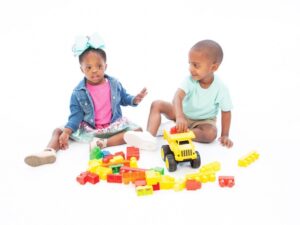
Are Toddlers Socially Stunted? The Importance of Socialization
The Internet has made it possible for adults to interact and work throughout the pandemic, but we have a generation of toddlers who have not had a playdate in over a year–if ever. Coaxing a two year old to sit in front of a screen and interact with a peer is not likely to happen. Attention spans are forming at this age, so watching another toddler play with her toys is not interesting. The most problematic issue parents worry about is that their toddler has missed learning social cues because she cannot physically interact with her peers. Research is beginning to say otherwise.
STARTING WITH STAGES
Parents watch their infants discover and start recognizing familiar faces, learn simple games like peek-a-boo and begin understanding social interactions. At around age one, they start following simple directions like cleaning up their toys. They are gaining much-needed independence around that age, too.
It seems that the moment they turn two, everything changes. It feels “terrible,” but it is some of the most incredible memories. The youngest of toddlers are exploring who they are and what they like and do not like, and their autonomy becomes everything, if not challenging.
When it comes to playing with peers, two years old is when social interactions get tricky. Cynthia DiCarlo, Ph.D., the Executive Director at the LSU Early Childhood Education Institute, explains, “Although they are interested in other children, they prefer to play near, but not yet with other children.”
However, COVID-19 has taken away toddlers’ abilities to even sit in the same room with one another. They are missing an integral part of the socialization process. It is between two and three that little ones explore themselves and how to interact with other children. Dr. DiCarlo explains this stage, “As they approach their third birthday, children begin to identify themselves in the mirror, know their gender, and play with other children. Twos play more independently from adults and are beginning to share.”
By age three, children learn how to play games that are both real and imaginary. Parental supervision is necessary because curiosity can lead to negative consequences. However, having play partners around their age is some of the most critical interactions.
In the final years of toddlerhood, a four year old begins to understand empathy for others. One of the most essential skills they learn through this is sharing and consequences for negative actions. Children start PreK at around this age, and it is also part of the curriculum, but COVID-19 has unfortunately put a pause on in-person classes.
The good news is, we are seeing the light at the end of the tunnel. Normality is returning. Many parents think their little ones will be playing catch up, but they are more resilient than we think.
THE RESILIENCE OF TODDLERS
All children are incredibly resilient when they have supportive adults in their lives. In many ways, they need parents or guardians more than they need to interact with other kids. It might feel like the loss of 2020 has stunted your toddler’s overall development, but it has only postponed it by a little. Rest assured that they will catch up on their socialization skills.
We underestimate the adaptability of our tiny humans, especially the youngest of them. Yes, in a perfect world, they would interact with other toddlers regularly, but it is perfectly okay if they do not. Pets, siblings, and parents can nurture and provide the socialization skills they need for future success.
Margie Stiles, the mother of a four year old, is thankful for their pandemic pet, “My son had just turned three, and we went into lockdown. Jacob was going to start preschool, and I found a five-day-a-week job. Things changed really fast, including the addition of a fuzzy mutt we both needed.” She continues, the memories causing such mixed emotions, “I was so scared about everything, but I watched Bark [dog] and my son learn from one another. I would watch them play in the mirror for hours and would not take a moment of that back.”
SUMMING UP SOCIAL SKILLS
Every child is different. The pandemic did not change that fact. As parents, we are having to relearn some of the same things that will be brand new for them. And, that is okay. Social and emotional learning is something that starts when we are infants and continues throughout our lives. During those first years, we develop coping mechanisms, build empathy, and learn to take responsibility for our mistakes. Research is starting to show that, while Coronavirus has led to loneliness, it is not necessarily true that it is causing long-term harm or depriving toddlers of their physical and emotional needs. As long as the needs are met at home, there is no damage done.
We are turning the corner on this once-in-a-hundred-year event. Toddlers will likely come out better than many of us; their resiliency is amazing. But, take one step at a time. The first few playdates might be a trial-and-error situation and feel challenging for all involved.
Dr. DiCarlo reminds parents of the rules of the road when it comes to any successful playdate. “In order to have a successful playdate, remember to consider your child’s schedule and plan for the playdate when he is well rested and fed. Playdates should be for a short duration, depending on your child’s age, and be supervised by adults,” she says.
If you worry that your toddler is stunted socially, try not to because it’s likely that he is not. Some of your toddler’s social skills might be on pause, but he will pick them right back up without missing a beat.





